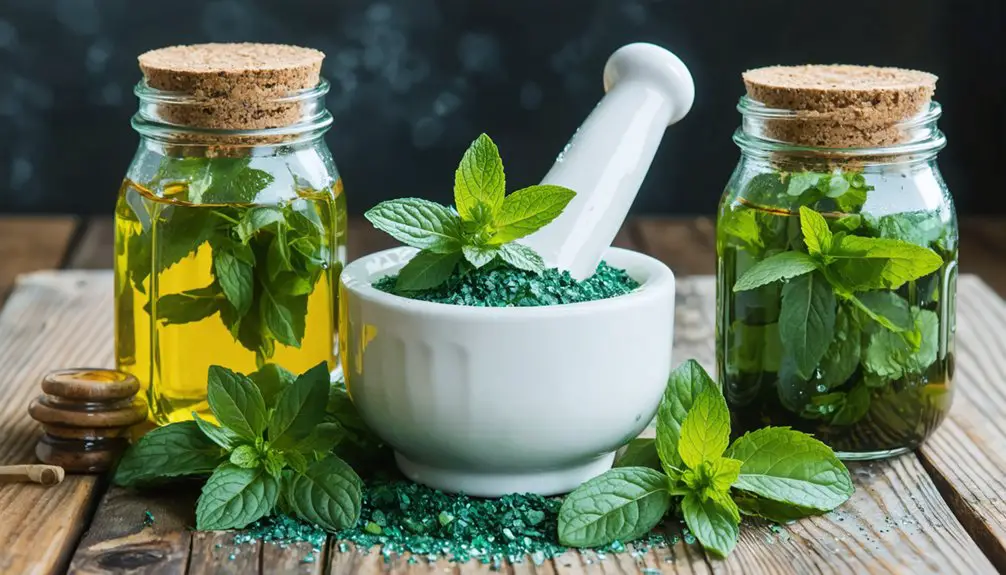Tea tree oil’s powerful antimicrobial properties can revolutionize your dental care routine naturally. You’ll fight plaque buildup, treat gingivitis, and protect against harmful bacteria – all while avoiding harsh chemicals. It’s twelve times stronger than traditional antiseptics and works effectively alongside professional dental treatments. As a natural anti-inflammatory, it soothes irritated gums and promotes healing. Discover how this remarkable oil can transform your smile from the inside out.
Key Takeaways
- Tea tree oil fights plaque naturally by killing harmful bacteria, reducing plaque buildup by up to 53% within two weeks.
- Acts as a gentle yet effective treatment for gingivitis, reducing gum inflammation and bleeding without harmful side effects.
- Delivers 12 times stronger antimicrobial protection than traditional antiseptics, targeting cavity-causing bacteria while maintaining oral health.
- Enhances professional dental treatments by preventing bacterial recolonization and supporting faster healing after cleanings.
- Provides natural relief from oral discomfort, including gingivitis and ulcers, while fighting bacteria that cause pain and sensitivity.
Natural Plaque Fighter: Your New Dental Defense
While many people turn to harsh chemicals for dental health, tea tree oil offers a gentler yet powerful approach to fighting plaque. Its natural antimicrobial properties target harmful bacteria like Streptococcus mutans that contribute to plaque buildup, without disrupting your mouth’s beneficial flora.
You’ll find that twice-daily rinsing with tea tree oil mouthwash can notably reduce plaque accumulation on your teeth, even in hard-to-reach areas. Clinical studies demonstrate that tea tree oil can reduce plaque levels from 53% to 5% in just two weeks.
What’s particularly exciting is that studies show tea tree oil’s plaque reduction capabilities rival traditional chemical agents like chlorhexidine, but without the unwanted side effects of tooth staining or altered taste.
Tea tree oil matches chlorhexidine’s plaque-fighting power while avoiding common side effects like stained teeth and taste disturbances.
When combined with regular dental cleanings, tea tree oil can enhance your oral care routine by disrupting bacterial biofilms and maintaining a healthier balance in your mouth’s microbiome. Research indicates that 0.2% to 0.5% concentration in mouthwashes is effective for improving oral hygiene.
Gentle Yet Powerful Gingivitis Treatment
Beyond its plaque-fighting abilities, tea tree oil shines as a gentle yet potent remedy for gingivitis. Clinical studies show it’s just as effective as chlorhexidine but without the unpleasant side effects like tooth staining or altered taste. Through gentle application, you’ll notice significant improvements in gum health as it reduces inflammation and bleeding.
What makes tea tree oil especially remarkable is how it works with your body’s natural healing process. When used alongside regular dental cleaning, it helps reduce inflammatory markers and supports tissue repair. Aboriginal healers traditionally used tea tree as medicine for treating various wounds and ailments. The oil’s unique composition of over a hundred compounds makes it a powerful natural antibacterial agent.
Its active compound, terpinen-4-ol, targets harmful bacteria while maintaining oral balance. You’ll appreciate the effective results – reduced gum inflammation, less bleeding, and healthier gums overall. It’s a natural, patient-friendly choice that delivers powerful benefits without harsh chemicals.
Superior Protection Against Harmful Oral Bacteria
When it comes to fighting harmful oral bacteria, tea tree oil stands as a natural powerhouse in your dental defense arsenal. Its remarkable antibacterial properties target specific troublemakers in your mouth, protecting your oral health without harsh chemicals. Tea tree oil is twelve times stronger than traditional carbolic acid antiseptics.
Research shows that growth inhibition rates exceeded 84% when using tea tree oil against harmful bacteria.
Here’s how tea tree oil safeguards your smile:
Tea tree oil defends your oral health naturally, providing powerful protection for a healthier, happier smile day after day.
- Blocks the growth of cavity-causing Streptococcus mutans while preventing harmful bacteria from sticking to your teeth.
- Combats aggressive periodontal bacteria like Porphyromonas gingivalis that can lead to gum disease.
- Reduces biofilm formation on both clean surfaces and existing plaque, helping maintain healthier teeth and gums.
You’ll find tea tree oil in various dental products, from toothpaste to mouthwash, typically in concentrations between 0.2% and 5%.
This natural solution offers effective protection while being gentle enough for daily use.
Enhancing Professional Dental Treatments
As a natural complement to professional dental treatments, tea tree oil considerably enhances the effectiveness of standard procedures like scaling, root planing, and periodontal therapy.
When used as an adjunctive therapy, it delivers up to 100 times higher therapeutic concentration than systemic treatments, leading to significant improvements in pocket depth and tissue attachment.
You’ll benefit from tea tree oil’s powerful ability to prevent bacterial recolonization after dental cleanings while supporting your body’s natural healing process.
Its anti-inflammatory properties help reduce swelling and promote faster recovery of periodontal tissues.
The oil’s purely plant-based composition makes it highly compatible with most dental procedures and patients.
As a periodontal enhancement tool, tea tree oil matches the effectiveness of traditional antiseptics like chlorhexidine but without unwanted side effects like tooth staining or taste alterations, making it an excellent choice for maintaining your results after professional dental work.
Comfort and Relief for Common Mouth Issues
Tea tree oil provides powerful natural relief for common mouth discomforts, from gingivitis to oral ulcers. This natural remedy supports oral healing by reducing inflammation and fighting harmful bacteria that cause pain and sensitivity.
Tea tree oil naturally soothes mouth pain and fights bacteria, offering effective relief for gingivitis, ulcers and oral inflammation.
Recent studies have shown that tea tree oil offers broad-spectrum antimicrobial activity against various oral pathogens.
You’ll find it especially helpful for soothing irritated gums and promoting comfort during recovery.
However, it’s important to note that tea tree oil is toxic if swallowed and should only be used topically.
Here’s how tea tree oil can help your mouth feel better:
- Reduces gum inflammation and bleeding within two weeks of regular use
- Fights infection-causing bacteria without staining teeth or altering taste
- Speeds healing of mouth ulcers while providing natural pain relief
For those seeking gentle yet effective mouth care, tea tree oil offers a natural approach to managing mouth sensitivity and discomfort.
When used properly in rinses or gels, it supports your body’s natural healing processes while keeping oral bacteria in check.
Frequently Asked Questions
Can I Swallow Tea Tree Oil Mouthwash if I Accidentally Do?
Don’t swallow tea tree oil mouthwash – it’s toxic. If you accidentally swallow any, contact poison control immediately and watch for symptoms like dizziness or vomiting. Always spit out thoroughly when rinsing.
How Long Does It Take to See Results From Tea Tree Oil?
You’ll notice initial bacterial reductions within 7 days, but ideal results take 2-3 weeks with twice-daily application. For periodontal improvements, expect significant changes after 1-2 months of consistent use.
Is Tea Tree Oil Safe to Use During Pregnancy?
While tea tree oil’s safety during pregnancy requires caution, you can use it topically if properly diluted. Avoid use in your first trimester, never ingest it, and stick to store-bought products with minimal concentrations.
Can Children Use Tea Tree Oil for Oral Care?
While tea tree oil can support children’s oral hygiene, you’ll need to be extremely cautious with supervised use, proper dilution, and guarantee they don’t swallow it. Consider gentler alternatives for children’s safety.
Will Tea Tree Oil Interfere With Existing Dental Work or Restorations?
You can safely use tea tree oil with your dental work. Research shows no significant interactions between tea tree oil and common restorations, and it may actually help protect your existing dental investments.
References
- https://www.frontiersin.org/journals/pharmacology/articles/10.3389/fphar.2023.1116077/full
- https://pmc.ncbi.nlm.nih.gov/articles/PMC7069753/
- https://pmc.ncbi.nlm.nih.gov/articles/PMC3800405/
- https://www.todaysrdh.com/oral-benefits-of-tea-tree-oil/
- https://www.rdhmag.com/infection-control/disinfection/article/16409194/tea-tree-oil-just-a-fad
- https://pubmed.ncbi.nlm.nih.gov/38864380/
- https://www.quintessence-publishing.com/usa/es/article-download/5458585/oral-health-and-preventive-dentistry/2024/volume-22/the-effect-of-local-application-of-tea-tree-oil-adjunctive-to-daily-oral-maintenance-and-nonsurgical-periodontal-treatment-a-systematic-review-and-meta-analysis-of-randomised-controlled-studies
- https://www.thieme-connect.com/products/all/doi/10.1055/s-0040-1703999
- https://gumdiseaseguide.org/brushing-teeth-with-tea-tree-oil/
- https://www.nature.com/articles/s41432-022-0259-6



